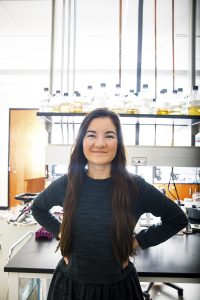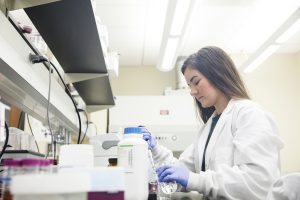By David Miller

Libby Beddingfield was plenty motivated for a future career in medicine when she arrived at The University of Alabama four years ago.
That wasn’t always the case.
Beddingfield pondered majors in both arts and sciences while attending Evangel Christian School in Birmingham. But in 2015, her grandfather developed lung cancer and passed away shortly after. Just two years later, her father would be diagnosed with cancer. He would have a lung lobectomy and is currently free of cancer.
Since attending UA, Beddingfield’s direction has been clear: a career in oncology.
“[It can be] in research or clinical work,” she said. “Ideally, I’d like to do a little bit of both.”
Beddingfield will earn a bachelor’s degree in chemical engineering in May.
She’s awaiting word of her acceptance to medical school, and she’s hopeful her lab research and public health service while at UA strengthens her résumé.
For the past three years, Beddingfield has worked in UA chemical engineering professor Dr. Ryan Summers’ lab, studying the effects of caffeine on the beta-galactosidase enzyme and the LacZ gene.
Beddingfield also participated in a Beyond Bama alternative service trip to Nicaragua during her sophomore year. There, UA students served in a variety of capacities, from delivering medicine to taking vital signs at rural clinics. She credits that trip for illuminating the disparities in healthcare and influencing future service work at UA.
Doctors and patients in Nicaragua did the best with what they had, and their resiliency was inspiring, Beddingfield said. She recalls native Nicaraguans walking more than 10 miles for Tylenol. Once, while shadowing a surgeon, she saw a man have surgery to repair a broken tibia, with only local anesthetic to numb the pain.
“We were in places that had dirt floors and metal chairs, and people were having their teeth extracted. But they were so strong – they were barely getting local anesthetic. Up to that point, I didn’t know someone could pass away from getting a cavity.” Libby Beddingfield
During in-home visits with patients, the definition of “need” for native Nicaraguans was further shaped. Beddingfield said one of the families had a temporary roof that they could no longer afford and an autistic family member that wouldn’t get the diagnostic services or interventions needed.

“It was eye-opening,” Beddingfield said. “We weren’t allowed to, but I probably could have paid for their roof with the money that was in my backpack.
“Their problems are so real and important, but everyone was so kind and welcoming.”
Beyond Bama provided Beddingfield an opportunity to practice her Spanish-speaking skills while immersed abroad and within the construct of a mission, which was challenging, she said. Beddingfield struggled to understand patients’ needs and requests, and though she had the help of two translators, the experiences would motivate her to improve her Spanish language skills and serve others that speak it as their primary language. In May, Beddingfield will finish a class titled, “Spanish for Healthcare,” and she’s been teaching English as a Second Language classes in middle schools in Tuscaloosa.
Additionally, Beddingfield has served as an interpreter at the Maude L. Whatley Health Center in Tuscaloosa. That role helped her build more compassion for the patients that need translator services, she said.
“Similar to Nicaragua, there’s a lack of knowledge, and a lack of resources available to gain that knowledge. Even some of the resources translated into Spanish aren’t understandable. So it’s been neat to be part of that, being able to simplify instructions a little bit, and give knowledge to people, even for things like recommending families keep a thermometer in the home.”
